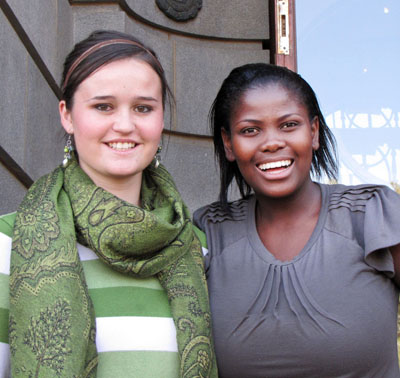Latest News Archive
Please select Category, Year, and then Month to display items
12 October 2020
|
Story Arina Engelbrecht
|
Photo Supplied
 Arina Engelbrecht from Organisational Development and Employee Well-being believes physical activity has a number of benefits for one’s health, including stress relief.
Arina Engelbrecht from Organisational Development and Employee Well-being believes physical activity has a number of benefits for one’s health, including stress relief.
Being physically active plays a big role in preventing the development of mental-health problems and in improving the quality of life of people experiencing mental-health problems.
Treatment for depression
Physical activity can be an alternative treatment for depression. It can be used as a stand-alone treatment or in combination with medication and/or psychological therapy. It promotes all kinds of changes in the brain, including neural growth, reduced inflammation, and new activity patterns are formed that promote feelings of calm and well-being. It releases endorphins – powerful chemicals in the brain that energise your spirit and make you feel good.
Physical activity can be very effective in relieving stress. Research in adults has found that physically active individuals tend to have lower stress levels compared to individuals who are less active. It also leads to improved sleep. When a person sleeps better and feels more rested, overall quality of life improves. They cope better with daily life stressors.
Reduce Alzheimer's risk
Regular physical activity can reduce your risk of developing Alzheimer's disease by up to 50%. It can also slow down further deterioration in those who have already started to develop cognitive problems. It stimulates the brain’s ability to maintain old connections as well as to make new ones.
A study asked people to rate their mood immediately after periods of physical activity (e.g. going for a walk/run, cycling, doing housework) and periods of inactivity (e.g. reading a book or watching television). Researchers found that participants felt more content, more awake, and calmer after being physically active compared to after periods of inactivity.
In conclusion, people who are physically active feel a sense of well-being, feel more energetic throughout the day, sleep better at night, have sharper memories, and feel more relaxed and positive about themselves and their lives.
“Being physically active not only changes your body, it changes your mind,
attitude, and your mood.” – Arina Engelbrecht
Student Transformation Forum kicks off
2010-08-19
 |
|
Ms Nida Jooste and Ms Modieyi Mothole
Photo: Lize du Plessis
|
The establishment of a Broad Student Transformation Forum (BSTF) at the University of the Free State (UFS) was initiated yesterday with a student consultative forum called to determine the agenda and delegations to the BSTF.
The establishment of the BSTF follows the suspension of the functioning of the Student Representative Council (SRC) recently and aims to provide students broadly with the opportunity to reach consensus regarding student governance at the Main Campus in Bloemfontein.
The meeting was chaired by student affairs specialist Prof. Cecil Bodibe and was attended by representatives from student associations from all faculties, representatives of non-faculty student associations and representatives from residences. Commuter students were represented through private student associations.
“The meeting clearly expressed agreement that decisions taken by the BSTF should ensure that the student body and student-life programmes truly reflect our constitutional commitment to building a non-racial, non-sexist and democratic society, and that collaboration between students and management in affecting the decisions of the BSTF to achieve this should be prioritised,” Mr Rudi Buys, Dean of Student Affairs, said.
The forum agreed that apart from addressing specific questions pertaining to student governance, the BSTF should also address transformation issues broadly. The forum also agreed that the delegations to the BSTF should ensure that the forum is truly representative of the diverse student population and is inclusive of all stakeholder groups, including international students and students with disability. A proper process to determine the credentials of participating association was requested and will be implemented.
The meeting furthermore expressed the wish that the BSTF should exist only to determine the key changes that should be made to student governance now, so that the postponed SRC elections may continue as soon as possible. The BSTF will thus have a temporary role to enable the student body to reach consensus regarding changes to the SRC constitution.
Meanwhile, an Interim Student Committee (ISC) was appointed, which has the role to ensure the continuation of daily student life programmes and to ensure student representation in management and governance of the university continues during the deliberations of the BSTF. The ISC serves as an interim structure that will dissolve when a new SRC takes office following the outcome of the BSTF and the continuation of the SRC election.
The ISC consists of 15 members who were appointed through a process of nomination of four (4) members each from the faculty-student associations, non-faculty student associations and from residences, and three (3) members from the student executive committees of Kovsie Community Service, the Irawa student newspaper and the Kovsie Rag executive committee.
The ISC elected Ms Modieyi Mothole and Ms Nida Jooste as its chairperson and deputy-chairperson, respectively.
“I’m encouraged with the initiative and response of students to ensure student governance continues, which bears witness to the depth of leadership our student body holds, while the level of engagement by students in the BSTF indicates that the student body seriously consider issues of transformation,” said Mr Buys.
Media Release
Issued by: Lacea Loader
Director: Strategic Communication (actg.)
Tel: 051 401 2584
Cell: 083 645 2454
E-mail: loaderl@ufs.ac.za
19 August 2010